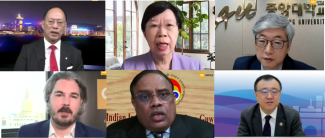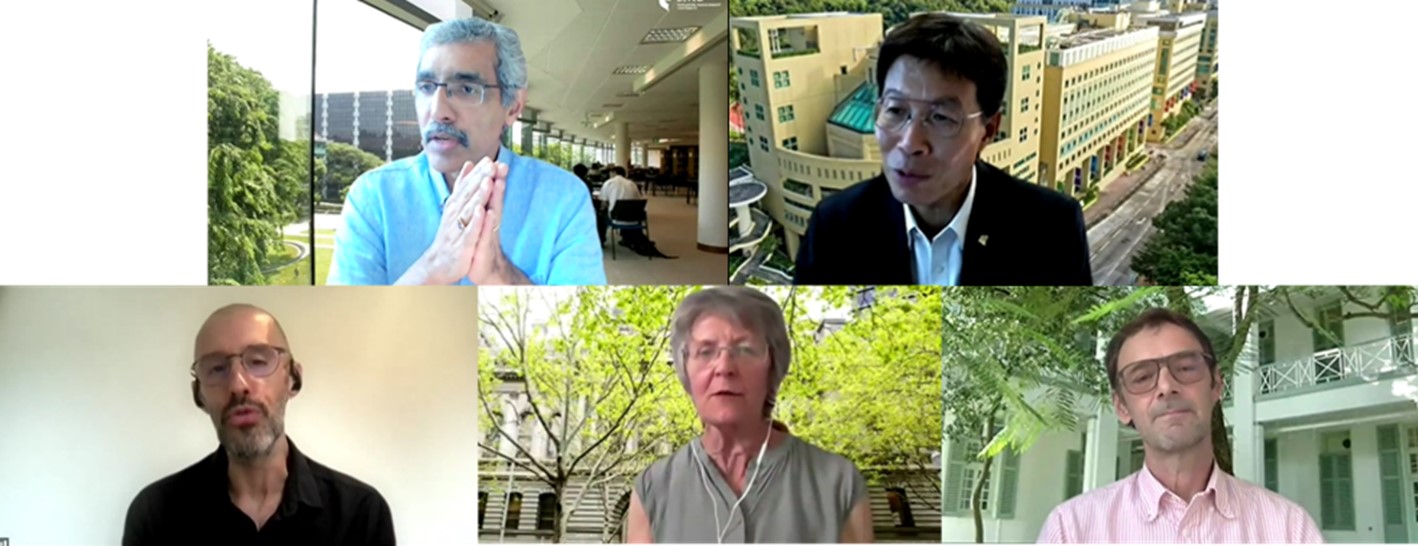
“Universities prepare students not just for jobs and the economy, but for their roles in society and in life,” said SMU President, Prof Lily Kong, at the QS-Asia Pacific Professional Leaders in Education (QS-APPLE) Conference on 1 Nov 2021. She urged university leaders to consider the structures that they had put in place, and the policies and tools they had on hand, to support these responsibilities, at a Presidents’ Panel Discussion themed “Building Resilient Universities for Tomorrow: An Asian Perspective”.
Held virtually over three days from 1 Nov, the 17th annual QS-APPLE Conference brought together more than 80 distinguished speakers from leading universities and organisations in the region, to discuss pertinent issues revolving around the theme of “Future Rebalance: Emerging trends and workforce in the Asia Pacific”. SMU’s senior management members were participating at the Conference in line with SMU’s strategic priority area of “Growth in Asia”, where the University sought to offer a deep understanding of Asia’s economy, polity and society.
Building Resilient Universities for Tomorrow: An Asian Perspective
Amid global changes that are disrupting and reshaping societies today, higher education institutions need to stay true to, and be guided by their responsibilities to remain resilient and relevant for the uncertain future.
One such responsibility lies in the area of knowledge production through research. Prof Kong acknowledged that citations and other global academic indices played an important role to inform of the rigours of research. However, she urged universities to be attentive to research and engagement opportunities that could make meaningful impact to local communities but fly under the radar when viewed through a global lens.
The narrative would not be just about the intellectual journey but also the impact journey, and hence “a balance between international impact in an intellectual way and local impact in real terms” is needed, she added.
Prof Kong’s fellow panellists included Hong Kong Baptist University’s (HKBU) President and Vice-Chancellor, Prof Alexander Wai; Chung-Ang University’s Provost and Executive Vice President of Research, Prof Joonki Paik; Tsinghua University’s Vice President and Provost, Prof Yang Bin; and Indian Institute of Technology Guwahati’s Director, Prof T. G. Sitharam. QS’ Editor and Programme Designer, Mr Anton John Crace, moderated the session.
Commenting that the theme of the dialogue was “spot on”, Prof Kong surmised that the building of resilient universities was crucial, as it would in turn contribute to the building of resilient economies and societies, nationally and globally.
During the hour-long session, the panellists also exchanged views on the role of social science research and the challenges of measuring its impact. Prof Kong cited an interesting programme evaluation project by a group of SMU students with a non-profit organisation that sought to measure social impact by quantifying the tangible, as well as intangible benefits of its programmes and activities.
Prof Yang opined that the SMU students’ project was a prime example of how the use of rigorous research methodologies could play a role in influencing societal perceptions – in this case, of the work done by the local non-profit organisation. He added that as a result of the students’ meaningful endeavour, outcomes became “tangible and impactful”.
View the discussion here.
Cultivating Great Minds (Innovation in Pedagogy)
On Day Two of the Conference, Vice Provost (Education) Prof Venky Shankararaman spoke on a panel session themed “Cultivating Great Minds (Innovation in Pedagogy)”, with a focus on SMU-X, the University’s flagship experiential learning programme.
He characterised SMU-X as a pedagogy that “combines academic with experiential learning, to solve real-world problems – through interdisciplinary lens”. Under the programme, students work in small project teams, with faculty and industry practitioners as active mentors, to develop solutions for issues that are faced by partner organisations.
The experiential learning framework allows students to apply their disciplinary and interdisciplinary knowledge in a real-world setting. More importantly, it provides them with ample opportunities to hone essential workplace skills, such as collaboration, communication, critical thinking and self-directed learning.
Prof Shankararaman added that the innovative pedagogy offers value to faculty members as they get to engage with industry and bring these project experiences into the classrooms subsequently. For industry partners, the value lies in the fresh perspectives from students who often view issues from a different angle from those within an organisation.
Other panellists in the hour-long discourse included HKBU’s Director at the Academy of Visual Arts, Prof Louis Nixon; Victoria University’s Associate Director for Improving Learning and Teaching in Connected Learning, Ms Kaye Cleary; and Minerva Project’s Managing Director (Asia), Mr Kenn Ross. HKBU’s Vice-President (Teaching and Learning), Dr Albert Chau, moderated the session.
Prof Nixon shared his academy’s experience in establishing a “shared campus” platform with six other international institutions a few years ago. The collaborative framework and digital tools had proved instrumental in enabling students to continue benefitting from meaningful cross-cultural experiences and cross-disciplinary exposure during the Covid-19 pandemic.
Prof Shankararaman said close collaborations with international partners had, likewise, allowed SMU to carry on providing students with global exposure opportunities through SMU-X Overseas courses, which pivoted to virtual engagements for projects with overseas organisations amid international travel restrictions.
